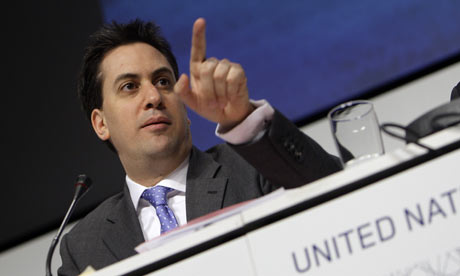
Ed Miliband has pointed the finger at China over the outcome of the UN climate summit in Copenhagen. Photograph: Anja Niedringhaus/AP
John Vidal, environment editor
guardian.co.uk, Sunday 20 December 2009 20.30 GMT
The climate secretary, Ed Miliband, today accuses China, Sudan, Bolivia and other leftwing Latin American countries of trying to hijack the UN climate summit and "hold the world to ransom" to prevent a deal being reached.
In an article in the Guardian, Miliband says the UK will make clear to those countries holding out against a binding legal treaty that "we will not allow them to block global progress".
"We cannot again allow negotiations on real points of substance to be hijacked in this way," he writes in the aftermath of the UN summit in Copenhagen, which climaxed with what was widely seen as a weak accord, with no binding emissions targets, despite an unprecedented meeting of leaders.
Miliband said there must be "major reform" of the UN body overseeing the talks – the UN Framework Convention on Climate Change (UNFCCC) – and on the way negotiations are conducted. He is said to be outraged that UN procedure allowed a few countries to nearly block a deal.
The prime minister, Gordon Brown, will repeat some of the UK's accusations in a webcast tomorrow when he says: "Never again should we face the deadlock that threatened to pull down [those] talks. Never again should we let a global deal to move towards a greener future be held to ransom by only a handful of countries."
Only China is mentioned specifically in Miliband's article but aides tonight made it clear that he included Sudan, Venezuela, Bolivia, Nicaragua and Cuba, which also tried to resist a deal being signed.
But in what threatened to become an international incident, diplomats and environment groups hit back by saying Britain and other countries, including the US and Australia, had dictated the terms of the weak Copenhagen agreement, imposing it on the world's poor "at the peril of the millions of common masses".
Muhammed Chowdhury, a lead negotiator of G77 group of 132 developing countries and the 47 least developed countries, said: "The hopes of millions of people from Fiji to Grenada, Bangladesh to Barbados, Sudan to Somalia have been buried. The summit failed to deliver beyond taking note of a watered-down Copenhagen accord reached by some 25 friends of the Danish chair, head of states and governments. They dictated the terms at the peril of the common masses."
Developing countries were joined in their criticism of the developed nations by international environment groups.
Nnimmo Bassey, chair of Friends of the Earth International, said: "Instead of committing to deep cuts in emissions and putting new, public money on the table to help solve the climate crisis, rich countries have bullied developing nations to accept far less.
"Those most responsible for putting the planet in this mess have not shown the guts required to fix it and have instead acted to protect short-term political interests.".
In a separate development, senior scientists said tonight that rich countries needed to put up three times as much money and cut emissions more if they were to avoid serious climate change.
Professor Martin Parry of Imperial College London, a former chair of the UN's Nobel prize-winning Intergovernmental Panel on Climate Change, said: "Even if non-binding pledges made at Copenhagen are completely fulfilled, there is a 1.5C 'gap' leading to unavoided impacts. The funding for adaptation covers impacts up to about 1.5C, and the mitigation pledges to cut climate change down to 3C at most ... leaving 1.5C of impacts not avoided because of the failure of adaptation and mitigation to close the gap."
The UN climate chief, Yvo de Boer, said: "The opportunity to actually make it into the scientific window of opportunity is getting smaller and smaller."







If people want a green world.
ReplyDeletethen stop buying Chineese products.
China frustrated the COP top,
now people of the world decide themselves.
No more "made by china" unless approved by a green label.
We make china transparent! That should be done anyway.
Digital democracy of the third millennium: how can you expect your
government to take responsibility if you do not even bother about a green
label ?
You don't have to wait tille the next top, start yourselves, start today, start small! If governments want to join, they shloud implement green labels. Imagine a green label, next to "made by china" hi hi